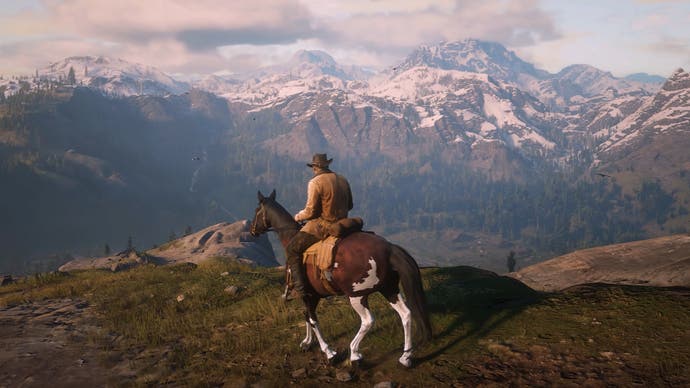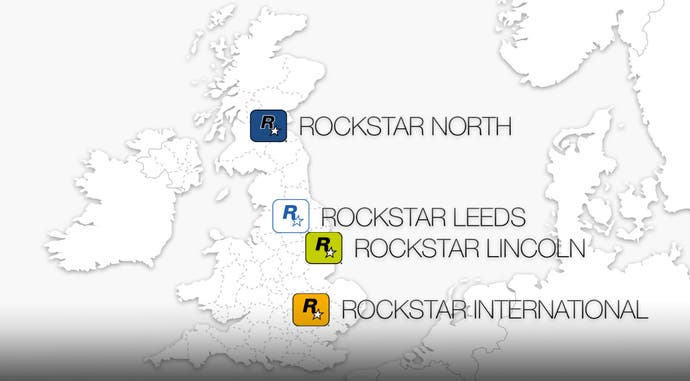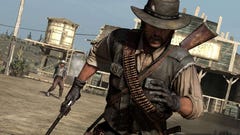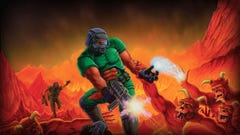The human cost of Red Dead Redemption 2
According to the people who made it.
Red Dead Redemption 2 launched at midnight last night and, right now, millions of people around the world are playing. It's been a long wait - a friend told me recently they'd placed their pre-order over two years ago. The reviews, as expected, are positive. I can't wait to play it.
But I also can't shake some of the stories I've been told by those behind the game - the people who put their lives on hold to get Red Dead Redemption 2 released this week, who poured their sweat and tears and so much of their time into perfecting the thing you're probably playing right now.
A few of these Rockstar staff have already spoken up, spurred by the ongoing discussion around overtime and crunch culture at the company - and there's an excellent Kotaku report which crunches the numbers. Some staff have been encouraged by Rockstar to speak publicly. Others were not. Over the past few weeks I've talked with people who wanted to share their stories, under condition of anonymity to protect their careers, to further that discussion. They are proud of their work and want Red Dead Redemption 2 to succeed, but desperate to see Rockstar's production processes changed. The extreme workload staff have faced over the course of this project in particular has taken a toll - on people's health, relationships and their ambitions of maintaining a career in the games industry. Simply put, some people feel they cannot go through this again.
Rockstar did not respond to Eurogamer's requests for comment on this article.

"Back when we worked normal hours I never felt anxiety going back into work," someone at Rockstar Lincoln told me. "But over the past year I have. Under normal circumstances it is work we can do to a very high standard, and we consider ourselves a very capable department. We put a lot of pride in what we do. It's just the amount of time we're there. I almost feel guilty, I can't give 100 per cent of my ability as mentally I'm just shot. And as someone who people look to as an example - that's been difficult."
Rockstar is an enormous enterprise, staffed by thousands of people with many varying experiences. Headquartered in New York, Rockstar operates three big studios here in the UK as well as a separate London office. Just up the A15 in Rockstar Lincoln, more than 300 people work in QA (quality assurance) and localisation. The studio is open 24 hours a day, with staff working around the clock in shifts, testing Rockstar's games over and over and over.
"The fear is those at the top have seen how profitable this is working at 150, 200 per cent."
Staff at Lincoln have been in crunch mode on Red Dead Redemption 2 for over a year, multiple people I spoke to at the studio told me - long even by Rockstar standards. Since October 2017, late finishes during the week and on two Saturdays each month have become mandatory. Breaks are unpaid and "often" worked through. In August this year, hours increased further. Every working week was six days, with hours just under the 60 mark.
"It's not a naturally sustainable thing to do, to put in that amount of hours, to work this much, with no end in sight," one person said. "And the fear is those at the top have seen how profitable this is working at 150, 200 per cent and wonder why we should ever slow down. Now months have turned into over a year and we're staring down the barrel of this not actually ending because there will always be more things coming out."
For night shifts, UK employment laws state a person can only work eight out of every 24 hours, but Rockstar employees sign agreements to waive this condition. Over the course of a week, night staff can work the same amount as those on days. Regardless of when they work, the many Lincoln staff I spoke to talked of getting home physically and mentally exhausted, with little time to do anything before heading to bed and getting up to do the same thing the next day. The overriding sense is that, while extended hours have been accepted as a temporary burden in the past, the long period of crunch for Red Dead Redemption 2 has defeated people.
"I am tired. I don't have time for myself, or to see those I care about," another Rockstar Lincoln employee told me. "I don't remember the last time I went on a date with my girlfriend. My family live 30 minutes away and I don't remember the last time I saw them in person. There are friends I used to see on a weekly basis that I am now lucky to see every few months. There are friends that I used to see every few months that I haven't seen for years. When there is a requirement to work six days a week, and longer hours within the week, you have to 'sacrifice' a day off to actually live your life. It becomes a choice of missing out on rest and being tired for the week, or being selfish and taking a day for yourself, which is a horrible choice to make."
Everyone I spoke to at Rockstar Lincoln said these hours were "mandatory".
Rockstar has always been known for its polish, but those hours have to come from somewhere. And while I began simply asking about Red Dead Redemption 2, it was clear Rockstar's crunch culture has been long been just that - part of the company's culture.
"I've definitely done more than 100 hours," someone who worked at Rockstar North recalled of their time on GTA4. "Some people would come with sleeping bags. They would work until two or three in the morning, then unroll their sleeping bag, go to sleep under the desk, then get up at six or seven and start working again. It was usually two nights because it would become unbearable. And then you'd do a normal day - finishing at eight o'clock." Says someone else, who worked on GTA5: "It got to the point where I was napping under my desk. I wasn't the only one. It got to the point where it hit lunch times - or the equivalent, as I work nights - and you would get people having a sleep under their desk rather than eating. You were just so exhausted." And another: "During the port of GTA5 to PS4 and Xbox One we crunched for a year straight. Our usual hours were 9am - 8:30pm Monday to Saturday. Some were asked to work Sunday and throw away any weekend or day off."
"It got to the point where I was napping under my desk. I wasn't the only one."
Staff I spoke to said there's no question of not doing these hours.
"It's called Mandatory Overtime or extended hours. It's pretty clear," someone who worked on GTA5 and Red Dead Redemption 2 told me. "There was a point on GTA5 when we were brought in by department and told we'd be working an extra 16 hours a week now," another person recalled. "That was as official as anything became. It was pretty much: 'we'd really appreciate you working an extra 16 hours a week and if you don't we won't appreciate it'."
Former Rockstar and Telltale employee Job Stauffer tweeted last week that on GTA4 working in the New York office was like "working with a gun to your head seven days a week", and that staff would feel pressured to be in the office at all hours in case Rockstar's founders Sam and Dan Houser came in. "Managers ensure people work at all times," someone who worked at Rockstar North at the same time concurred, "even if they don't have work to do - to make sure they're in and looking busy. So that those bosses can say 'look, all our guys are working 80+ hours a week'." Someone I spoke to who worked in New York had a slightly softer memory of it all. "Here's the thing about working in the NY office: the people that used to work late wore it like a badge of honor. Seriously, they were into it and got a kick out of putting more hours in than their colleagues. It never felt like we had to be there though. I think people just assumed that the extra hours would be rewarded down the line."

Red Dead Redemption 2 has been an enormous project for Rockstar, more than seven years in the making. It was once considered for release as a cross-gen game with versions for PlayStation 3 and Xbox 360 as well as PlayStation 4 and Xbox One, people familiar with the game's earliest stages have told me, on a timescale which would have once seen it arrive several years ago. But ambitions grew, and GTA Online was a far bigger hit than expected, so as GTA5 was ported to PS4/Xbox One and GTA Online's lifespan extended, RDR2's development bubbled away in the background. Crunch has not been ongoing this entire time, but it has ramped up earlier, not slowed after public delays to the game, and employees fear it will continue longer with the launch of live service Red Dead Redemption Online in November.
"Crunch gradually goes up until you're in a state where you're working all available hours, basically," a Rockstar North employee told me. "You do 40 hours a week and that's fine and normal. And then things get busier and you do 60-70 hours a week. And you do that a long time. And then you get mandated weekend days. 'We want everyone in on every Saturday for the next X amount of months. And we don't want anyone taking time off.' And then it would be 'We want to start seeing you every second Sunday.' And then it would be 'Why aren't you at work?' I had that on GTA5 and said 'Well, I've done everything.' And the response would be 'Well, we need to see you in.' It did genuinely seem like it was a lot of hours for very little [gain]."
Where previously crunch would happen "for a month and things would go back to normal", staff fear increased hours may be never-ending. GTA5 crunch continued past its ship date, one person at Rockstar Lincoln told me. The fear is the same will now happen with Red Dead Redemption 2. "Even with the game done, hours have only gone down to three lates a week and one weekend day," another person at Rockstar Lincoln explained. "When we crunched for the next-gen launch of GTA5 we got to it and then crunch would be extended for another month and another as various GTA Online add-ons came out. That's been such a huge commercial success it stands to reason we're doing the same thing again. The need to support Red Dead Online post-launch means hours will go back up again."
The effect of these increased hours on staff health is inescapable, staff say.
"I know people who suffered breakdowns," one Rockstar North staff member told me. "We'd be told quietly those people had to go and they'd been taken ill and be off for three months. Some people, we'd hear later they wouldn't be coming back. There was a time you were always worried - what if you pushed it too far? I know someone on GTA5 who took a stroke aged 30-something. They went back to work after a while. It was brutal. That was the lifestyle."
"I only worked at the North office for a year," another person told me. "I saw people working themselves too hard, their relationships failing and health deteriorating."
"You were always worried - what if you pushed it too far?"
"You turn up and you keep putting in the time and you tell yourself it will have an end date," another staff member told me. "But as Red Dead Redemption 2's release date changed we knew extended hours would continue. In the past few months - those August, September weeks where we were in without any choice whether we could leave or not - no one wants to be seen as the weak one. It's hard to see people get downbeaten, you can see the work rate diminish through sheer exhaustion because of the number of hours for this long. And you don't want to get put in a pool of people who won't progress because senior management see them as not agreeing with 'the norm'."
Mental health struggles are a common theme among those I speak with.
"I see the HR department doing the best they can but it's not simple," one person told me. "People's lives have been put on hold for well over a year. They're missing key moments in their children's lives. Obviously other studios have crunch. It may last for a month, and during that month may be the moment your child starts speaking for the first time. But because it's been a year, the spectrum of things people have missed out on has risen exponentially. It's no way to live."
Everyone seems to have a story, or know someone affected. "I know a number of people signed off work because of depression or anxiety," one person says. Says another: "I worked for a number of years in the Lincoln QA studio on GTA5 and RDR2. I ended up leaving due to personal circumstance and the job itself driving me into a suicidal depression." "I know people that have given up on dating," a third person tells me. "I know people whose relationships have ended because they just can't see partners."
Some company figures in mid-to-high management positions have gained reputations for cracking the whip, junior employees tell me - people who "make everyone work as hard and as long as possible and don't tolerate anything less". "You were expected to live your life 24/7 around what Rockstar wanted you to do," one former staff member says. "The effort was so great under such brutal warnings of 'you're not working enough, you're not working enough'."
"During GTA4 time at Rockstar North there was someone who had just had a baby and he was coming in early during the week and working late so he had weekends free," one person recalled. "He'd make sure all of his tasks were cleared, there were no bugs. But he was told by his boss at the time it was important he came in, and worked weekends. He said he couldn't come in at weekends as he would never see his family, but he was keeping on top of everything and keeping all his bugs down. Everything that was asked of him he'd do, and he was doing overtime during the week. So the boss went away, came back and dumped a load of stuff on his desk, and said, 'You'll have to work weekends now.' It was a matter of, you work the hours we want. He didn't last long after that."

Multiple people have told me of friends who have missed children's birthdays. One person told me of a taxi driver they proudly boasted to about a job interview at Rockstar, only to be warned off because of the state staff sometimes turn up in when calling a cab.
Requests to be exempt from a particular overtime shift can be denied unless it is considered urgent, Rockstar Lincoln employees have told me, and staff are asked to work the time back. If an employee can't work a day's overtime on a particular weekend, they will have to make that time up during the weekend following - which can see people working 13 days back-to-back without rest.
One quote I've heard from multiple people is from a manager telling staff who did complain: "If you don't like it, fuck off and work down Tesco's."
So why not leave? The consensus among staff I've spoken to is they stay because of Rockstar's continuing reputation as an industry-leading developer, and because of a camaraderie with friends and colleagues at the studio in the same boat.
"We're a collective, we're working towards the same goal and if I didn't work with the people I do, I would have thrown in the towel," one person told me. "Camaraderie is the saving grace and a large part of what keeps us going," said another, who described their colleagues as "wonderful people all incredibly passionate about the industry. We support one another to keep the wheels turning. A common theme of leaving emails is that people have stuck it out far longer than they thought able due to the friends they've made along the way, but ultimately have had to leave to repair their mental health." "You're in a shit situation but if you think about leaving you feel bad they're still going to be in this shit too," a third person says. "It's like abandoning your family, which sounds silly when you could get paid better at a supermarket."
"I see Red Dead Redemption 2 developers putting in 70 or 80 plus hours a week being taken advantage of."
But there's something else too - a fear quitting Rockstar means giving up a dream job, and progress towards a promotion. "I see Red Dead Redemption 2 developers putting in 70 or 80 plus hours a week being taken advantage of," someone tells me. "They don't want to let the company down because they respect the people they work for and love the industry they work in - and they want to progress. They don't want to be a junior forever. They don't want to be seen as someone unwilling to put in the hard graft. They work themselves to the bone so they don't get a label stuck on them. Even if it won't happen - there's the fear it might."
Some people don't know any different. "We've had people join who have never known a 37.5 hour week and some people here for whom this is their first job, their first foot in the door at one of the biggest companies in one of the biggest industries in the world. If they feel what's happening isn't fair or too much for them, they won't speak out. This could be the beginning of something incredible for them in the industry, but by speaking out it could all be over."
At Rockstar Lincoln, many are on temporary contracts, which ups the pressure to perform. On GTA5 these were three months long ("so you had two months of work, several weeks of panicking wondering if you needed to find a new job, and then often working past the contract and waiting to hear if you have been extended"), but these are now six months - a small improvement.
And, put simply: "People still want their job, still need their job, still have families and bills to pay and probably enjoy the job - it's just the hours. People are worried if they say anything they'll lose their job."

Rockstar staff I spoke to said they wanted to work at the company, just for a more manageable amount of hours. Staff say they know the company is well respected in the industry, that many of their colleagues are friends, and that they are "absolutely proud" of the work they have done. "Rockstar is the biggest name in the games industry and we love the work, we want to do it," someone says. "But it's damn hard."
I asked staff how they wanted Rockstar to improve. Better communication came up a lot. Much of the design of the game is determined by a relatively small number of people at the top - mainly in New York - while everyone else attempts to do as best they can with the instructions. "There are people directly under them who don't want to make a decision," one person says, which leads to teams sometimes "just wasting time - people doing things which aren't needed or doing things based on best guesses". This can lead to work getting scrapped and then put back in and having to be redone.
Crunch is an industry-wide problem, staff acknowledge, but Rockstar is seen as a leading light for its products - why couldn't it be for how it treats the people who make its games, too? "Other companies do it but just because it's done isn't an excuse to do it," someone says. "You make billions of dollars, some of the biggest games. The people at the bottom are being overworked on minimum wage. People forget about the people at the bottom."
"You make billions of dollars. The people at the bottom are being overworked on minimum wage."
"We've grown a lot in terms of staff but the workload has grown equally, and beyond the amount of people we have," a staff member at Rockstar Lincoln adds. "It's clearly not enough if we need to work an entire year of extended hours, two months where we only have one day off a week and barely get an evening to ourselves to just unwind. AAA games with a five-year dev cycle shouldn't have this horrendously hyper crunch at the end with people working 90+ hours a week. Surely down the road, as you're developing, something isn't quite right."
Of course, Rockstar has deadlines to hit and a parent company to serve. Red Dead Redemption 2 arrives in prime position to scoop up this year's big Christmas sales, and has already suffered several delays. Rockstar was unlikely to consider pushing the game back further - to the extent Red Dead Online will arrive later and with an unusual beta tag attached. But staff wish there had been more time, better planning, less stress.
"The public loves our products and while everyone loves complaining about waiting for them, waiting until they are ready is something I think people would understand," one person says. "Because the initial deadlines were obviously unobtainable and now we're releasing a multiplayer labelled in beta, which shows those deadlines don't work."
Not everyone has experienced crunch, and it's important to note those who have not worked significantly extended hours, or who have and for whom the hours have been livable. Rockstar has nine studios and thousands of employees. If I was a Rockstar employee in a team where this did not affect me, I would want to share my voice too, without the accusation I was muting or replacing others.
As one Rockstar employee wrote on Twitter last week: "We're simply tired of a one-sided narrative about how we're all seemingly the root of all evil. It invalidates all the work we put into improving our culture and it's unfair. Hundreds of people can't all be painted with a single brushstroke."
But this is exactly why Dan Houser's recent comments on crunch and his subsequent attempt to downplay their impact riled up those who felt their experiences were not being reflected. If one good thing came out of all that, it's that it emboldened Rockstar staff to speak out now. And the discussion is making changes, albeit small ones. At Rockstar Lincoln, staff members were told in a meeting last Friday all company overtime was now supposedly "voluntary", although checking in with staff this week suggests little has altered in practical terms.
"It's completely optional but you'll probably be putting your colleagues out if you don't help."
"Naturally it's a worry that people not working overtime now, even when it is 'voluntary', will get a black mark against their name," someone told me yesterday. "There's still a large number of people in for this week down for overtime," another added. "It's completely optional but you'll probably be putting your colleagues out if you don't help with it." Said a third: "It feels like a step in the right direction. I truly hope this is the start of change, at least." "Supposedly we won't be penalised for not doing it," a fourth person added, "but it was advertised as a good opportunity for employees to go the extra mile to impress. I myself am still going to do some overtime as this is an incredibly busy time and I'm aware of how much needs doing to pull together for a successful launch." It feels like Rockstar still has work to do to make this change stick.
At the start of this week, Rockstar Games' tweet about Red Dead Redemption 2's day one patch details included a special message for its employees - "Thank you to everyone worldwide who helped make #RDR2 happen!" and a link to a newly created staff page, which includes the names of people who have since left the company and therefore missed out on actual in-game credit. ("We never got this on GTA5," one staff member noted to me.) More than 3000 names are listed. 3000 people who worked on Red Dead Redemption 2. Looking down the list I can see many of the people I've spoken to for this article. They are hoping Red Dead Redemption 2 is a huge success, something which pays off all the hard work they have put in. They are hoping things will be better next time around. And why shouldn't they be? Why should games have to be made this way? With the billions of dollars Red Dead Redemption 2 will make Rockstar, I've yet to hear one good reason.
Rockstar is usually a fortress of silence, a company which lets its games do the talking. But these past few weeks have seen the dam break and its staff speak out - some for the first time in their careers - about the sacrifices they have made and the fear they may have to do this again.
It is now up to us to listen.






.png?width=240&height=135&fit=crop&quality=80&format=jpg&auto=webp)









